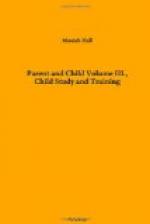QUESTIONS FOR DISCUSSION
1. What have you observed in children to prove that religious emotions are instinctive?
2. In what ways can the home best foster the natural religious instincts of childhood?
3. What religious habits should the home cultivate?
4. What can the church best develop in children?
5. Why should the parents support loyally the Sunday Schools and other organizations of the church?
6. What is the supreme opportunity of the church during the adolescent age?
7. What means have you used successfully to develop the religious instincts of your own children?
8. What opportunities for spiritual self-expression and service does our own church offer?
9. In what ways are we richly rewarded by our free-will service in behalf of our church?
“The Child and His Religion,” by Dawson, will be a helpful book to study in connection with this lesson.
TRAINING IN THE SCHOOL
Certain Phases of Training and Education Can Be Accomplished Better by the School Than by Any Other Agency. A National System of Industrial and Vocational Education Should Be Established
The school is a social institution whose functions are becoming daily more widely understood and more clearly defined. In the history of civilization, the school, as we know it, is a very recent institution. Nation after nation has arisen, reached its zenith, declined, and passed away without dreaming of such a thing as universal education. With the growth of democracy, particularly during the Reformation, the ideal of education as the birthright of every child became well defined and during the years that have intervened, this ideal has become a living reality.
At first the universal education was advocated for the sake of the church. Martin Luther believed that every child should have schooling so that he might be able to read the Bible and study the catechism. For some time the church had charge of and controlled education, but gradually, as democracy developed, the influence of the state began to overshadow that of the church, and education came to be recognized more and more as a function of the state, and its control was gradually taken over by the latter institution.
The chief function of education, therefore, may be seen clearly from the foregoing. In a democracy it is necessary for every child to be educated because the existence of free institutions is based upon the intelligence of the masses. Jefferson once remarked: “If anyone believes that free government and an ignorant people can exist at one and the same time, he believes that which never was or never can be.” Universal education is, therefore, a social necessity; its chief purpose is to train and instruct the child in the duties and ideals of citizenship. He must be instructed in the history of his country and learn




